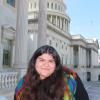I wouldn’t necessarily consider my home university a liberal campus, but I specifically come from a very liberal and seemingly inclusive bubble of community with a strong activist culture of social justice and inclusion. In this small bubble, I do not have to explain why it is offensive to call me Jackie Chan or ask me if I’m from Japan; people of color shouldn’t be the ones to educate and white folks should seek out resources to educate themselves; it’s easily understood that microaggressions are offensive. The list goes on.
Coming from this bubble, I found it hard to adjust to everyday interaction in Morocco. I got catcalls; people insisted calling me “chinui(Chinese)” even after I told them firmly in Moroccan Arabic that I have a name and that my name is not “Chinese”; passers-by spoke random Asian languages to me and did to me whatever random greetings that they think all Asian people do. When I walked in traditional Moroccan clothing to the Moroccan wedding organized by IES Abroad Rabat, young adults on one entire street harassed me together and kept yelling “Jackie Chan” at me. I got so irritated but struggled to even react at first because of the language barrier. I used to practice the following Darija expressions in my room:
“Baraka! Fhmti? Skut! (Enough! Understand? Shut up!)
“3lech? Chnu bghti? (Why? What do you want?)
“Ana machi Japon. Safi. (I’m not Japanese. Enough.) ”
Every day felt like a potential invitation for a battle. I was so ready to grill racist (in my opinion back then) Moroccans as to why they said racist things to me and tell them to stop. Are my feelings valid? Yeah. Think about it: nobody ever goes around white people and speaks random European languages at them and yells, “Spain? Germany? Russia?”; nobody bugs them about where they are originally from. After white people moved to the US and called it their home, it became their home; when people of color moved to the US and called it their home, it wasn’t, and still isn’t, recognized as such. But the more I think about it, my attitude really compromised my experience in Morocco. As racist as these comments might have come across as, they didn’t necessarily come with malicious intentions, in Morocco at least. When I contextualize the interactions and think about how the world portrays Asia and the U.S, how little the world knows about China, and how white mainstream media is in the US, I can easily see why I get those comments. Of course, ideally, I wouldn’t want it to happen. But I came to realization that one can always understand, though not necessarily always agree with, another person. I don’t agree with the people that I found offensive and would not do the same, but I understand where they are coming from and how their views are shaped by their lived experience.
I think recognizing this point is crucial for the United States right now, where political polarization is driving people apart. In my liberal bubble, I can always hear comments such as “Trump supporters are just racists” or “Check your white privilege” that does nothing but shuts down conversations. There is always a possibility to understand someone when you contextualize their behaviors and thinking and reflect on how their past experience has shaped who they are and the choices they make.
After going through this thought process, I changed how I acted. I ignored all the adults and teenagers that I ran into because I know there is nothing I can do to change their mindset in a short interaction, but I did choose to talk to little kids, who probably learned these catcalls from the older without necessarily understanding their connotations and to whom I could probably make a difference. Here is one interaction that I had with a Moroccan kid in the old medina in Moroccan Arabic (mixed with Classic Arabic).
“Ni Hao.”
“What’s Ni Hao?”
“It’s Chinese.”
“Why Chinese? Am I Chinese?”
“I don’t know.”
“You tell me now. Am I Chinese?”
“I don’t know…”
“Maybe I’m Japanese, maybe French, Spanish…”
“Maybe German.”
“Yes, maybe German. You understand?”
“Yes.”
“If I’m Japanese, and you say Ni Hao, I’m not going to be happy. You understand?”
“Yes.”
“Okay that’s it. Take care.”

Chen Yu
Speaking fluent Mandarin Chinese, English, and conversational Czech, Yu Chen is currently looking to perfect his French during his upcoming semester abroad in Rabat. Passionate about revealing social and structural inequalities around the world through film and media, Yu Chen is pursuing a bachelor’s degree in Gender & Sexuality Studies and Digital Media Production.
Previously, Yu Chen has studied environmental issues in Okinawa, conducted research on social practice art in Puerto Rico, exchanged at the Film & TV School of Academy of Performing Arts in Prague, and tasted 44-year-old homemade Serbian Rakija in Belgrade.







